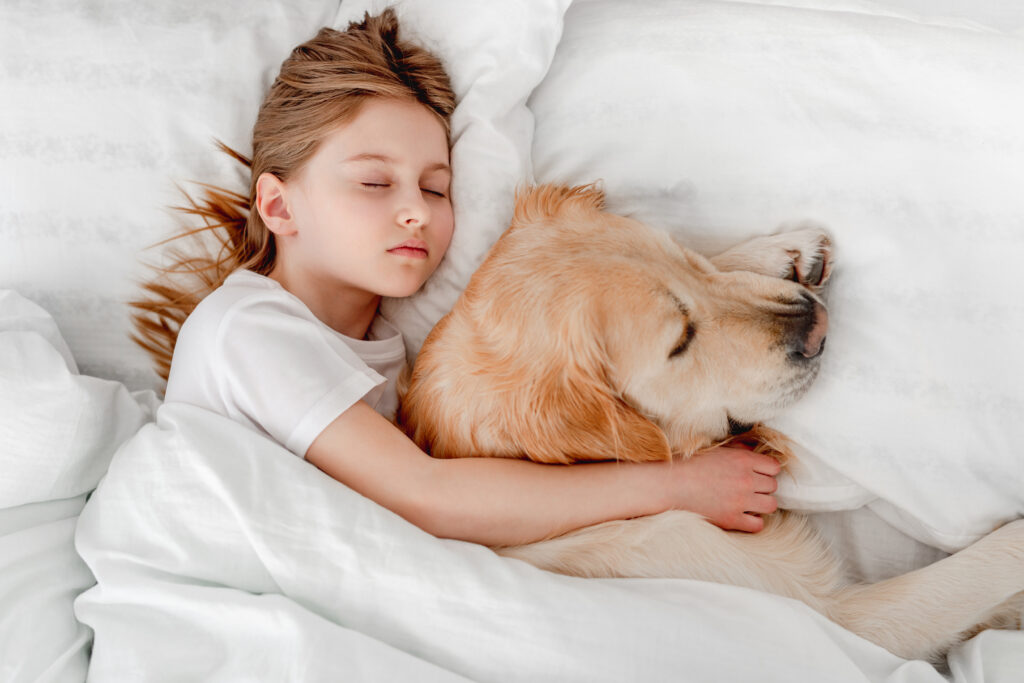
Sleeping with our pets is it the ultimate comfort or could it be a disturbing habit? Many of us cherish those cozy nights when our furry friend curls up next to us, offering warmth and companionship. Their rhythmic heartbeat and the soft hum of their breathing can be a soothing lullaby, luring us into a peaceful sleep. However, for others, the experience might not be as blissful. The constant movement, the occasional noise, or even allergies can turn this comforting situation into a nightly disturbance. In this blog post, we will delve into the pros and cons of sharing your sleep space with your pets, and how it might affect both you and your animal companions.
The benefits of sharing your sleep space with pets are both emotional and physical. Emotional comfort is a significant perk as pets provide a sense of companionship, alleviating feelings of loneliness or anxiety, thus promoting better sleep. The warmth they provide can be particularly comforting during colder months, offering a natural, cozy heating system. Additionally, this practice can strengthen the bond between you and your pet. The shared experience of sleep can foster a deeper sense of trust and mutual respect, enhancing the overall relationship. Despite these benefits, it’s crucial to note that individual experiences may vary, and what works for one pet owner may not necessarily work for another.
On the flip side, sleeping with pets might pose several challenges that could disrupt your sleep. Pets, especially dogs and cats, may have different sleep cycles than humans, leading to possible disturbances throughout the night. They may move around, snore, or even try to play during your sleep hours. Allergies are another aspect to consider. Even if you’re not typically allergic to your pet, being in such close proximity for an extended period can trigger reactions. Also, some people may have hygiene concerns, considering that pets spend a significant portion of their day outdoors. Lastly, there’s the issue of dependency. Pets, just like humans, can develop habits. If they get used to sleeping in your bed, they might have a hard time adjusting to change if the situation requires it, leading to potential behavioral issues.
Pets’ sleep cycles differ greatly from those of humans. Dogs and cats, in particular, often have polyphasic sleep patterns, meaning that they sleep multiple times throughout the day and night. This is especially true for cats, who are known to be crepuscular creatures, most active during dawn and dusk hours. As such, our monophasic sleep pattern (a single, long period of sleep) might be disruptive to them. Additionally, our pets’ sleep requirements change as they age, with kittens and puppies needing much more sleep than adults. Therefore, the constant disturbances during their rest period can lead to stress and behavioral issues in the long term. Similarly, the light and noise pollution that is often present in our sleep environment can negatively impact pets, potentially causing anxiety or confusion. Therefore, while sleeping with pets may offer comfort to us, it’s essential to consider the potential impacts on the pets themselves.
Deciding whether to share your sleeping quarters with your pet is a personal decision that should be made after careful evaluation of your lifestyle, health, and type of pet. If you’re a light sleeper or suffer from allergies, it might be better to establish a separate sleeping area for your pet. However, if you’re someone who suffers from anxiety or loneliness, having a pet by your side may provide immense emotional comfort and improve your quality of sleep. The type of pet is also a key factor to consider. Dogs and cats, for instance, are more adaptable to human sleep patterns than other pets such as birds or rodents. Lastly, remember that a decision that works at one point may need to be reevaluated as circumstances change, such as new health issues or changes in your pet’s behavior or age.
Creating a sleep-friendly environment is essential when deciding to share your bed with your pet. This involves ensuring that your bed and surrounding environment are comfortable and safe for both you and your pet. Pet friendly bedding that is durable and easily washable can help manage pet hair and odor. It’s also important to consider the noise and light levels in your room. As mentioned earlier, excessive noise or light can disrupt your pet’s sleep. Therefore, consider using earplugs, an eye mask, or a white noise machine to create a serene environment. If your pet is prone to moving around during the night, consider getting a larger bed or placing a separate pet bed nearby. This allows you both enough space to move freely without disturbing each other’s sleep. Finally, maintaining regular sleep and wake times can help regulate your pet’s sleep cycle and reduce nighttime disturbances.
Sharing your sleep space with pets carries both benefits and drawbacks. While the emotional comfort, warmth, and stronger pet-owner bond can enhance your sleep experience, potential disturbances, allergies, and dependency issues can disrupt it. Further, it’s important to consider the potential impacts on your pet’s health and sleep patterns. Deciding to sleep with your pet should be a personal choice, made after careful evaluation of your lifestyle, health, and pet characteristics. Keep in mind that the decision may need to be reassessed over time, as circumstances change. If you opt for co-sleeping, creating a sleep friendly environment can help mitigate some of the potential issues. Whatever your decision, remember to prioritize both your well-being and that of your furry friend. After all, a well-rested pet owner and a well-rested pet make for a happy, harmonious household.


